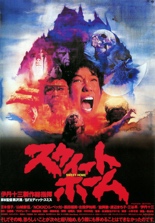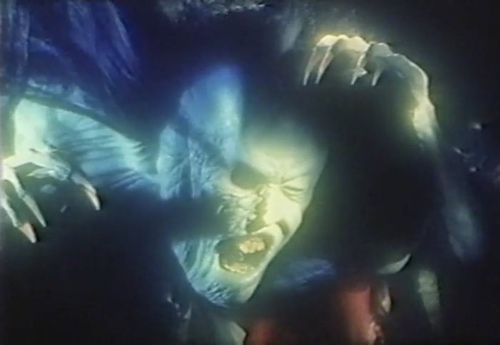
 Although the remote Mamiya mansion has been abandoned and off limits for 30 years, a Tokyo TV crew talks its way into gaining access for a documentary. The crew members insist the spacious, foreboding structure contains a lost mural by its former resident, the famed painter Mamiya Ichiro. Proving themselves correct, they immediately begin restoring the dusty wall of art to its former greatness, and in so doing, awaken dark spirits who never left the grounds — you know the kind: flowing dark hair and all.
Although the remote Mamiya mansion has been abandoned and off limits for 30 years, a Tokyo TV crew talks its way into gaining access for a documentary. The crew members insist the spacious, foreboding structure contains a lost mural by its former resident, the famed painter Mamiya Ichiro. Proving themselves correct, they immediately begin restoring the dusty wall of art to its former greatness, and in so doing, awaken dark spirits who never left the grounds — you know the kind: flowing dark hair and all.
With such concessions made for its homeland audience, writer/director Kiyoshi Kurosawa’s Sweet Home is a Japanese take on the American haunted house film. From Robert Wise’s suggestive shadows to Steven Spielberg’s Tobe Hooper’s more malevolent forces, Kurosawa (Creepy) builds upon trope after trope to provide shock after shock.

As the title suggests, Kurosawa employs the horror genre to examine society’s modern fractured family — in particular, the role of the mother as caregiver. Among the TV team, the producer (Shingo Yamashiro, Karate Inferno) is a single father who’s brought along his precocious daughter (pop singer Nokko, in her only feature credit), who’s pushing him to admit his attraction to a fellow crew member (Nobuko Miyamoto, Tampopo). On the Mamiya side, we learn the painter’s wife accidentally killed their toddler, who happened to be playing in the furnace when Mommy fired it up; hence, the hauntings.
But no worry necessary: Sweet Home is not some term paper on matriarchal dichotomy that’s been committed to celluloid; it’s a horror movie first, foremost and even second and third. Someone is bisected parallel to the waistline, while someone else takes an ax to the head, right between the eyes. And all the grisliness is brought to an in-camera believability with practical makeup effects by the legendary Dick Smith (The Exorcist), whose command of the craft is best exemplified by a character’s dissolution into a literal pile of bones.
Because it has yet to see an official release in the United States, Sweet Home is best known for its eponymous video game, developed in lockstep, which went on to inspire the multimedia juggernaut we know as Resident Evil. Credit where credit is due and all, but Sweet Home deserves global acknowledgment for its own worth, not insignificant. —Rod Lott
